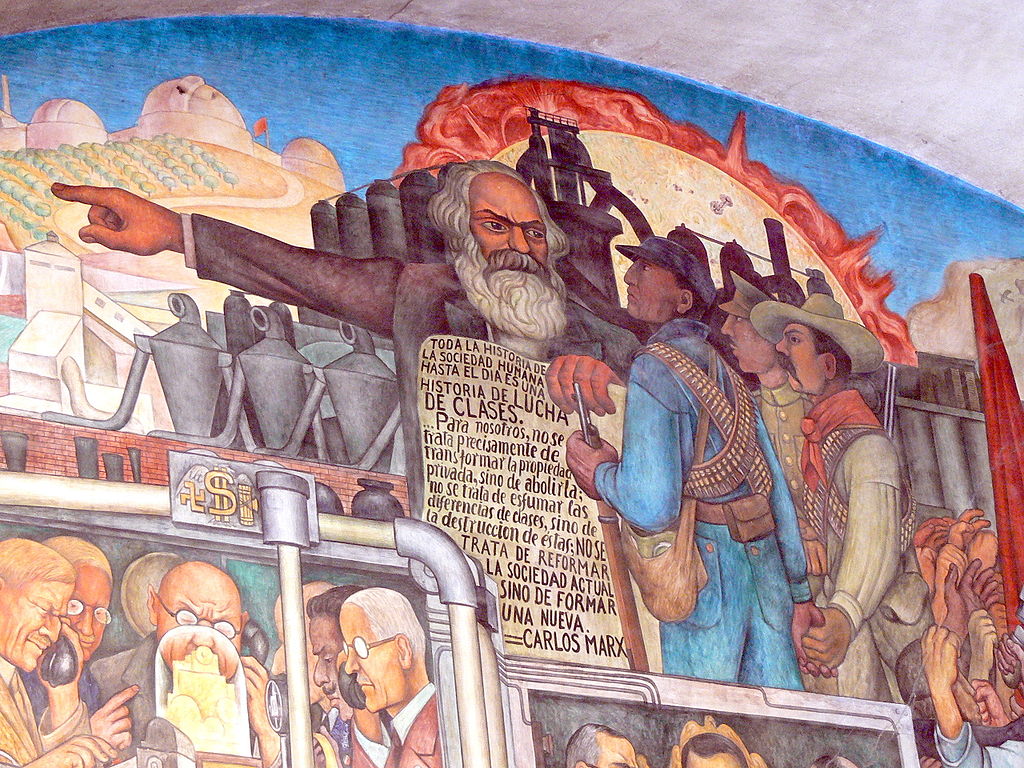In this weekend’s long-read article, Grigoris Markou surveys the re-emergence of Marxist and Communist ideas in contemporary political discourse. Tracing the relationship between Marxism and Populism, Markou concludes: ‘convergence between populism and Marxism seems to be extremely utopian for north European societies, in which capitalism, liberal thinking and excessive consumerism has become so ingrained in the majority of the people’s consciousness. Nevertheless, we have to think about an essential combination of populism and Marxism because, maybe, it is a real alternative path for the contemporary left-wing movement’.
In June 2017, Jeremy Corbyn’s and Labour party’s radical manifesto for the general elections was based on the populist slogan ‘For the many not the few’, pledging to re-nationalise public services and put an end to privatizations and neoliberalism. Commentators predicted that Labours, and the ‘old-fashioned’ socialist, leadership would lose easily. Nonetheless, Corbyn managed to strengthen the electoral presence of the centre-left party and threat the political establishment of the country. This was not an isolated event. Specifically, the outbreak of the economic crisis, the implementation of austerity measures, the increasing poverty and the post-democratic political context led to the people’s rejection of traditional centre-left and centre-right parties in several countries of Europe and America, as well as the rise of left-wing forces. SYRIZA’s monumental victory in the Greek elections of 2015 (January and September), Podemos’ dynamic electoral rise in Spain, the notable campaign of Bernie Sanders for Democratic Party’s nomination in the US and the left-wing populist hegemonies in Venezuela and Bolivia, are some examples of the new anti-establishment trend. Left-wing revolt against the liberal and social-democratic parties has caused a variety of reactions within European and American societies. Many scholars, journalists and politicians discuss a possible turn to Marxism. One year ago, John McDonnell, the Shadow Chancellor of the Exchequer, argued that “There’s a lot to learn from Karl Marx”, while Jeremy Corbyn described the German philosopher of Communism as a “great economist”. Some weeks before, Yanis Varoufakis wrote in the Guardian newspaper about the importance of Marxism today, declaring that Marx predicted our present crisis and the Communist manifesto showed us that we have the power to create a better world. Therefore, many of us wonder if we are witnessing a return to Marxist or communist ideas. Is Marxism actually coming back to the fore?

What’s radical left today?
It is true that many radical left leaders around the world have shown their deep sympathy for communist or socialist ideas, while a large part of left-wing parties formed radical coalitions of social-democratic, socialist and communist parties. In Great Britain, Jeremy Corbyn has been self-described as a “socialist” or “democratic socialist”, while in Greece, SYRIZA rose to power as a political coalition of several ecologist, social-democratic and euro-communist groups. In France, several political parties and organizations, such as the French Communist Party (PCF) and the Left Party (Parti de Gauche), gave their support to Mélenchon’s left-wing movements (Front de Gauche, La France Insoumise). Mélenchon is a historic figure of the social-democratic and euro-communist French political space. He left the Socialist Party in 2008 to found the Left Party (‘Parti de Gauche’). Moreover, many of us have heard about the socialist experiments of Latin American leaders, like Hugo Chavez, Nicolas Maduro, Evo Morales, which have resisted neoliberal forces and the predatory dispositions of foreign companies and countries, promoting an alternative path to equality and democracy (“Socialism of the 21 st century”). Of course, we cannot ignore the failures and the problems of this ‘socialist’ direction, like the economic insecurity and the concentration of power by one person, the President. This dynamic return of the Left was explained by political parties, media and numerous intellectuals with recourse to its populist character. Many of them talked about a possible return of Marxism through the emergence of left-wing populism. However, all the above cases have an important common feature: They are not Marxist, Marxist-Leninist, or communist in general!
The resurgence of the Left does not mark the return to the ideas of Marx, Lenin or Mao, but it’s in fact a new kind of left-wing populism, which seems to endorse a genuine implementation of social-democratic policies of the 20th century. But how did we get here? The gradual decline of orthodox Marxism within the Left, after the collapse of the USSR and the fall of the Berlin Wall, transformed the ideas and programs of left-wing parties. The new mosaic of radical left movements promoted the radical transformation of the political and economic system, rejecting the idea of “proletarian revolution” and supporting the values of democracy, equality and social justice. These political forces have been moving for many years on the “margins” of the political scene but the outbreak of the crisis provided them with the opportunity to gain more power through a “populist” criticism of the neoliberal globalised system.
What is populism? Populism divides society into two opposing groups, “the people” and “the elites”, through the connection of different popular demands and the formation of a collective identity (Laclau, 2005). According to Ernesto Laclau, “populism starts at the point where popular democratic elements are presented as an antagonistic option against the ideology of the dominant bloc” (Laclau, 1977). Populism can be found in any political movement and can be combined with any political ideology. Despite the fact that many scholars believe that populism is, par excellence, anti-liberal, there are many populist parties with liberal tendencies. The political platform and the policies that promote the populist parties vary accordingly to their political ideology, but, most of the times, include a social or popular character which aims to improve people’s life and protect the basic human needs. If we follow Laclauian perspective, we can see that, today, radical left parties and leaders express a strong populist discourse, as they use in their discourse the reference to “the people”. At the same time, they attack economic and political elites, which exploit the people through their anti-popular policies. The contemporary left-wing populist discourse can be labelled as “inclusionary”, since it promotes the political integration of marginalised, excluded and poor people (the plebs), expanding the boundaries of democratic politics. Nonetheless, it seems to keep its distances from socialists and Marxist ideas, approaching mainly the socialist-democratic parties that accept some parts of liberal orientations.

Marxism and Left-Wing Populism
Populism and Marxism possess two different traditions and theoretical insights, although they can be combined in a sense. For example, Marxism in Russia took place within the populist movement, while the communist states of the 20 th century provided to the subject of “the people” a great symbolic value. In the 19 th century, socialism and populism has been combined in some cases (e.g. Blanquism, Narodniks, etc.), while in the 20th century we can find socialist-populist characteristics in Cuba of Fidel Castro and in Africa in the “first wave” of socialist regimes of the 1960s. However, Marxism and contemporary left-wing populist parties don’t have many commonalities between them. Most often, ‘radical left’ references to Marxism, Lenin or revolutionary movements of the 20th century move in a ‘symbolic’ level, rather than in reality. In fact, the contemporary radical left is the continuation of the euro-communist parties of 1970’s and 1980’s, which developed theories and practices that did not faithfully follow Marxist and Leninist paths, criticizing some aspects of the Marxian analysis (sometimes through the work of Antonio Gramsci). For example, in Greece, SYRIZA is a substantial continuation of the euro-communist party of ‘KKE Esoterikou’ (‘Communist Party of Greece-Interior’) and the left-wing party of ‘Synapsismos’ (‘Coalition’). The harsh criticism of euro-communist and contemporary left-wing parties to key aspects of Marxist theory or Leninist visions eliminates any possibility of a real communist prospect.
We should not be surprised by the fact that many of left-wing leaders, such as Alexis Tsipras and Jean-Luc Mélenchon, utilize communist symbols in their rhetoric and electoral campaigns. Τhis is, essentially, just a show! Indeed, left-wing populism partially accepts bourgeois democracy and capitalism as an economic system, while underlines the importance of minority rights in contemporary society (e.g. LGBT rights, etc.), embracing thus a type of liberalism. Contrary to that, Marxism is inherently against capitalism and liberalism and in favour of people’s democracy (laocracy). Radical left parties reject the socio-economic structure of capitalism, consumerism and neoliberalism, but they do not believe in the proletarian revolution, neither in a society without private property. They do not attempt to construct a hegemony of the working class, but an alternative economic model within state capitalism and a radical form of liberal democracy in which the people will be able to participate effectively in the political process. For example, in Great Britain, Labour’s election manifesto of 2017 follows a Keynesian perspective, such as the Greek left and other “radical” cases. Labours promise to renationalise some of the ex-public sector companies, but they don’t discuss about the abolition of private property. As we can understand, despite the fact that leftists partly accept Marx’s critique of capitalism, they do not accept the Marxist view of a society without economic and social inequalities.
Of course, Marxism and communism, historically, are against populism. Communist leaders call upon “the working class” against the dominant system of people’s exploitation to break their chains and gain the power. Contrary to that, populists call upon “the popular subject”, which includes different people and social groups (workers, farmers, employees, unemployed, minorities, migrants, etc.). The main difference between Marxism and populism is that the first rests on a rigorous economic analysis and, most of the times, erases the “political” (of populism) from social struggles. If we take a look at the marginalised communist parties of Europe, perhaps, we can better understand the distinct differentiation from the radical left. The orthodox communist parties see populism as a “deceptive” ideology, which calls upon petit bourgeois class that does not seek a truly egalitarian society. For communists, the acceptance of capitalism as an economic system that can function well (capitalism with a human face) is a huge illusion, while, the radical parties which use communist symbols in their party logos, flags, anthems and rhetoric are considered as heretics. For instance, in Greece, the Communist Party (KKE) is a strong diachronic opponent of the radical left, arguing that the leftists of SYRIZA serve capital’s interests with their anti-popular policies. This is not a new kind of criticism. It is well-known Lenin’s criticism against the fundamental propositions of populism (Narodniks) and the populist perspective on the economic development of Russia. Lenin’s distaste for populism and the tendency to defend Marxism can be seen in his theoretical work (e.g. Who the “Friends of the People” are and how they fight against Social Democrats?).
In Defence of Populism?
In the era of the deep economic crisis, the rise of xenophobic forces, the increase of refugees flows and the post-democratic political scene, the dynamic re-emergence of egalitarian populism in Europe and America seems to be a bright sunshine of hope. The Left did not improve the working and living conditions of the majority of the people until today, but it contributed positively to some extent to politics. The left-wing populists attempted to prevent the establishment of an apolitical society of consensus (as neo-liberals desire), including the marginalised lower social class into political process, while they revealed the weaknesses and problems of the post-democratic model and aggressive neoliberalism, criticizing strongly the political and economic elites which are only interested for markets, numbers and profits. Moreover, they opened the ways for the radicalization of politics, gave motivation and hope to the people, promoted social policies and resisted neoliberal capitalism and imperialism.

But is this enough? Can left-wing populism be an alternative to the dominant anti-popular politico-economic system? We cannot be optimistic about that. The Keynesian and social-democratic perspective of the left-wing proposals do seem to be a real solution for the people. The contemporary left is trapped within an illusory capitalist logic and cannot escape the globalised environment, the logics of markets and liberalism. Both capitalism and liberal democracy have manifested their limits and their inability to serve popular interests and protect the rights of the people, but the radical left seems to accept the view that a communist prospect would have worse results. Hence, the populists do not want to break with the neoliberal institutions, succumbing to the pressures of banks, markets and institutions with the hope of managing to change something over the years. As we have already perceived in the Greek case, SYRIZA decided to reject the popular mandate of the Greek referendum (which was against the Memorandum agreement), accept the European partners claims and continue the implementation of austerity policies (privatizations of public companies, unbearable taxes for lower class, precarious working conditions, low wages, etc.). SYRIZA’s political leadership believes that the struggle within EU is the only hopeful way to change Europe and transform its politico-economic establishment for the good of the people. Τhis politico-economic direction has not substantiate yet that the future of the Greek people will be auspicious. In the same logic stands also the new transnational populist movement of Yanis Varoufakis (DiEM25). This new alternative movement believes that a change within the EU is able to “overturn the table” and improve the living and working conditions of the people. Nonetheless, this seems impossible. Αs, has been proven so far, the EU’s tough stance and Germany’s hegemonic attitude towards weak states cannot be easily overcome. It is needless to say that, today, the weak communist parties and organizations don’t have proposals for a popular and democratic path. Thus, a potential failure of left-wing populist parties will lead the Left to a dead-end.
We wonder what the future of the radical left will be in the near future. Can we have a new kind of populist left which will stand away from a state capitalist and (neo)liberal logic? Can we imagine a left-wing project with a socialist, Marxist and populist perspective together? This is quite difficult for the reason that Marxist ideas are based on an economic analysis that rejects pluralism and political competition in the communist society, while egalitarian populist ideas attempt to construct a new model of socialist society where political antagonism will be the main future of its existence. Furthermore, the convergence between populism and Marxism seems to be extremely utopian for north European societies, in which capitalism, liberal thinking and excessive consumerism has become so ingrained in the majority of the people’s consciousness. Nevertheless, we have to think about an essential combination of populism and Marxism because, maybe, it is a real alternative path for the contemporary left-wing movement.
Further Reading
Laclau, Ernesto. 1977.Politics and Ideology in Marxist Theory: Capitalism, Fascism, Populism. London: New Left Books.
Laclau, Ernesto. 2005. ‘Populism: What’s in a Name?’, in Populism and the Mirror of Democracy, edited by Panizza, Francisco. London: Verso.
Olson, Kevin. 2017. “Populism in The Socialist Imagination”, in The Oxford Handbook of Populism, edited by Cristobal Rovira Kaltwasser, Paul Taggart, Paulina Ochoa Espejo and Pierre Ostiguy, Oxford: Oxford University Press.
Read, Christopher. 2005. Lenin: A Revolutionary Life. London and New York:
Routledge.
Grigoris Markou is currently a PhD Candidate in Political Science at the Aristotle University of Thessaloniki, Greece. His PhD research is supported by theGeneral Secretariat for Research and Technology (GSRT) and Hellenic Foundationfor Research and Innovation (HFRI) (Scholarship Code: 391). His research interestsinclude: Argentinian and Greek politics, populism, democracy and radical left parties. Email: grmarkou@gmail.com






[…] Cross-posted from our partner website The New Pretender […]